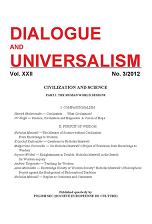ENLIGHTENMENT IN TROUBLE. NICHOLAS MAXWELL
ENLIGHTENMENT IN TROUBLE. NICHOLAS MAXWELL
Author(s): Szymon WróbelSubject(s): Philosophy
Published by: Instytut Filozofii i Socjologii Polskiej Akademii Nauk
Keywords: the Enlightenment; global crisis; growth of knowledge; growth of wisdom; justice; knowledge; knowledge-inquiry; liberal culture; liberal education; modern democracy; rationality; reason; social constructivists; wisdom; wisdom-inquiry
Summary/Abstract: The purpose of the text is to engage in a well thought critique of the Enlightenment project carried out by Nicholas Maxwell and to reflect upon the proposal of its reconstruction. Maxwell’s intellectual position is not at all obvious: he is neither a radical rationalist, nor a defender of scientific rationality, nor a postmodern and social constructivist. Postmodernists and social constructivists opposed the very idea of reason and rational inquiry, and have been thoroughly critical of what knowledge-inquiry represents. Indeed, such criticisms could not be further from Maxwell’s position. According to Maxwell, what is wrong with knowledge-inquiry is not its embodiment of reason but, to the contrary, its gross and damaging irrationality. From Maxwell’s point of view we suffer not that much from the excess of rationality, but its deficit. Maxwell does not share open criticism of anti-Enlightenment thinkers from Nietzsche to Foucault, but more so he escapes the beliefs of a scientifically focused group of philosophers who see the main force of emancipation of humanity in a narrowly understood science followed by physics, the methodology of verification, and naturalism as a basic ideology. The author of the text thus poses the question: what can save our culture if it is neither science nor the rejection of science? Does the replacement of the category of knowledgeinquiry with wisdom-inquiry—which Maxwell converts us to—bring us any closer to a solution in our consideration of knowledge and life, science and politics, facts and values, nature and society? In Western culture wisdom has always been an object of desire, and it was so, inter alia, because unlike knowledge it has never been precisely defined and further specified. Philosophers developed a warm feeling towards wisdom and sought for wisdom, but had they lived by wisdom? Finally, the author challenges the most difficult question: can we rationally excuse our hopes for wisdom and hope that it may one day be embodied in the work of institutions and the actions of individuals?
Journal: Dialogue and Universalism
- Issue Year: 2012
- Issue No: 3
- Page Range: 79-91
- Page Count: 13
- Language: English
- Content File-PDF

